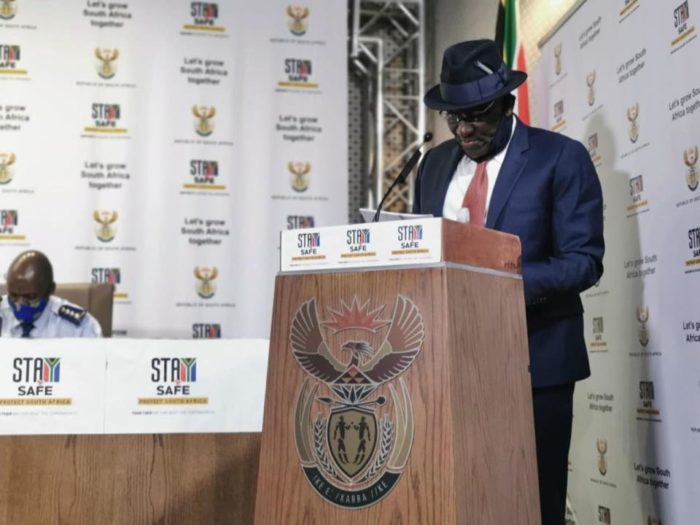Statistics show there have been major decreases in all crime categories compared to the same period last year, according to Minister of Police Bheki Cele.
Speaking during a live briefing on August 14, Cele detailed crime statistics for the period of April 1, 2020 to June 30, 2020 when the country was at Levels 5, 4 and 3 lockdown.
There has been a big drop in the number of sexual offences, recording a 39.7% drop on crimes such as rape and sexual assault. A 40.4% decrease in the number of rape cases were reported during the three months. Cele notes that there has been a reduction in crimes committed against women and children during this period, but these figures may be deceiving.
“These official figures also show a reduction in crimes committed against women and children during stage four and five of the Lockdown. However the low numbers of domestic abuse and sexual offences reported cases could have been due to some women not being able to escape their abusers and could not report crimes committed against them.”
He adds that the unavailability of alcohol has also played a role in reducing crime, evident in the decreased numbers of cases of contact crimes, which plummeted by 37.4%.
“This means there were 53 891 less cases of murder, attempted murder, assault GBH, Common robbery and common assault reported compared to the same reporting period.”
During the period observed, there was a 29.4% decline in Contact-Related Crimes made up of arson and malicious damage to property. Burglaries at residential premises dropped by over 30% although burglaries at non-residential premises increased by 9.1%.
Worryingly, there has been an increased number of attacks on schools and liquor outlets during this time. There were 2 692 reports of burglaries at educational premises and 1 246 liquor outlets were targeted. A total of 1186 suspects have been arrested for these crimes.
All top 30 stations that are reporting high levels of assault with intent to cause GBH too recorded drops in numbers. Common assault numbers declined from April and May while the country was under Level 4 and 5 but the gap started to close on June 1 when the country was eased into Level 3 of the lockdown.
Cele said that during this period, 298 252 people were arrested and charged for breaking lockdown rules, of which 181 579 were released on warning to appear before a court.
“28 337 of those arrested were found guilty of violations ranging from liquor, gathering, transport, business and cross-border related offences. Unfortunately, most of the people arrested will come out with criminal records and it is not our aim to criminalise South Africans. This is why the minister of justice and correctional services is looking at this issue,” he said during the briefing.
The police force have faced their own health difficulties amid the pandemic, and many have contracted COVID-19 on the frontline.
“Maintaining high-density visibility during a pandemic has come at a high cost. Despite our best efforts to keep the virus at bay by wearing protective equipment, sanitising our hands, vehicles and work stations and by maintaining social distancing while enforcing the law, 14 182 of our members tested positive for COVID-19. Majority of these infections occurred when the officers were in the front lines,” said Cele.
A total of 163 SAPS members have died from the virus, while 9563 have recovered.
Some 163 officers were arrested from the start of Lockdown for violating lockdown regulations.
“There are certainly many lessons to be learnt from these recent figures as the SAPS and how we must channel resources where they are needed most in an effort to sustain these low numbers,” concludes Cele. “But it is also time us as a country start having a frank and open discussion about alcohol and the real effect it has on society. The evidence is clear from these figures that the absence of alcohol leads to safer communities.”
Read his full speech HERE.
Picture: Facebook/South African Police Service

